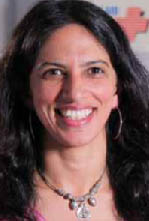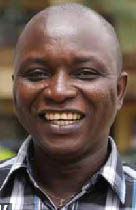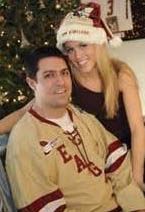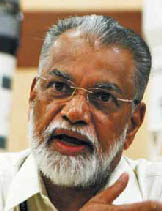Nature lauds the 'Perfect 10'
Koppillil Radhakrishnan, head of ISRO, is in Nature’s list of the ten people who mattered in science in 2014, says S.Ananthanarayanan.
“Selected after much debate and consultation by Nature’s editors, Nature’s 10 looks behind the major events and discoveries to show that, at its heart, science is a human endeavour,” says Helen Pearson, Nature’s chief features editor.
Suzanne Topalian is a US physician and researcher who has worked on a new approach to tackling the menace of cancer. Even as a medical student, she says, she was fired with the idea of using the body’s immune system to turn on cancer cells, in place of
the convention therapy of attacking the tumour with drugs or radiation. The new drug that she helped pioneer belongs to a class called PD-1 inhibitors (Programmed cell Death inhibitors), which block a defense of cancer cells to prevent the body T-cells
from acting. The drug has been approved for use in Japan and the US and analysts say it may become the cornerstone of cancer therapy in a few years.

Indian born Radhika Nagpal leads a team of engineers at Harvard University in the field of biology-inspired robotics. Taking a cue from a mentor when she was a student at MIT, Radhika built on the idea that the simple cell is the ultimate computer, with
groups of cells taking cues from the environment and self assembling to perform complex tasks. Radhika’s team has now got a swarm of 1024 small, three-legged robots, called kilobits, just a few centimeters wide and tall, and communicating with neighbours
through infra-red light, to assemble themselves into different two dimensional shapes. This level of cooperative behavior in robots is seen as a remarkable achievement, which can be scaled up to create robotic teams that can rapidly move to deal with disasters
or to aid environmental clean-up operations.

Sheik Hummar Khan was the heroic Sierra Leon doctor who succumbed to Ebola while treating patients during the outbreak in his country. He was part of the team that carried out the first genetic sequencing studies of the virus in Sierra Leone. This research
has shown how the virus is mutating and his team is installing sequencers all over West Africa to track its evolution. Hummar Khan had turned down attractive offers to work in Freetown or to teach abroad. He took the best precautions to protect himself but
his empathy with patients, which extended to physical contact with survivors, may have been his undoing.

30 year old Pete Frates of Massachusetts, graduate from Boston College and basketball player and coach was diagnosed with Amyotrophic Lateral Sclerosis (ALS) in 2012. Pete lost the ability to speak or move, but he began advocacy and to raise funds for
awareness of the disease. Pete, with his friend Pat Quinn of New York, are now credited as the creators of the Ice Bucket Challenge, an activity involving dumping a bucket of ice water on one's head to promote awareness of ALS, which went viral on social media
during the summer of 2014. Over 17 million ice bucket videos have been posted and US$ 115 million have been collected. The drive has shown the need to get people involved and has caught the attention of other advocacy groups. The National Organization for
Rare Disorders in Danbury, Connecticut, had held a seminar on viral fund-raising campaigns, and is planning a follow-up.

Koppillil Radhakrishnan, is head of the Indian Space Research Organisation (ISRO), and the success of India’s mission to Mars, in September, comes just before he retires, after forty three years of work on different projects of ISRO, from remote sensing
satellites, Tsunami warning systems, the cryogenic engine. India’s success in its very first attempt is creditable as over half the missions so far have failed. Radhakrishnan plays down his role, “I was like the conductor of an orchestra,” he says. But the
achievement has demonstrated India’s ability to develop and implement high-technology enterprises.
Here are five of them; To see the other five, go to the url